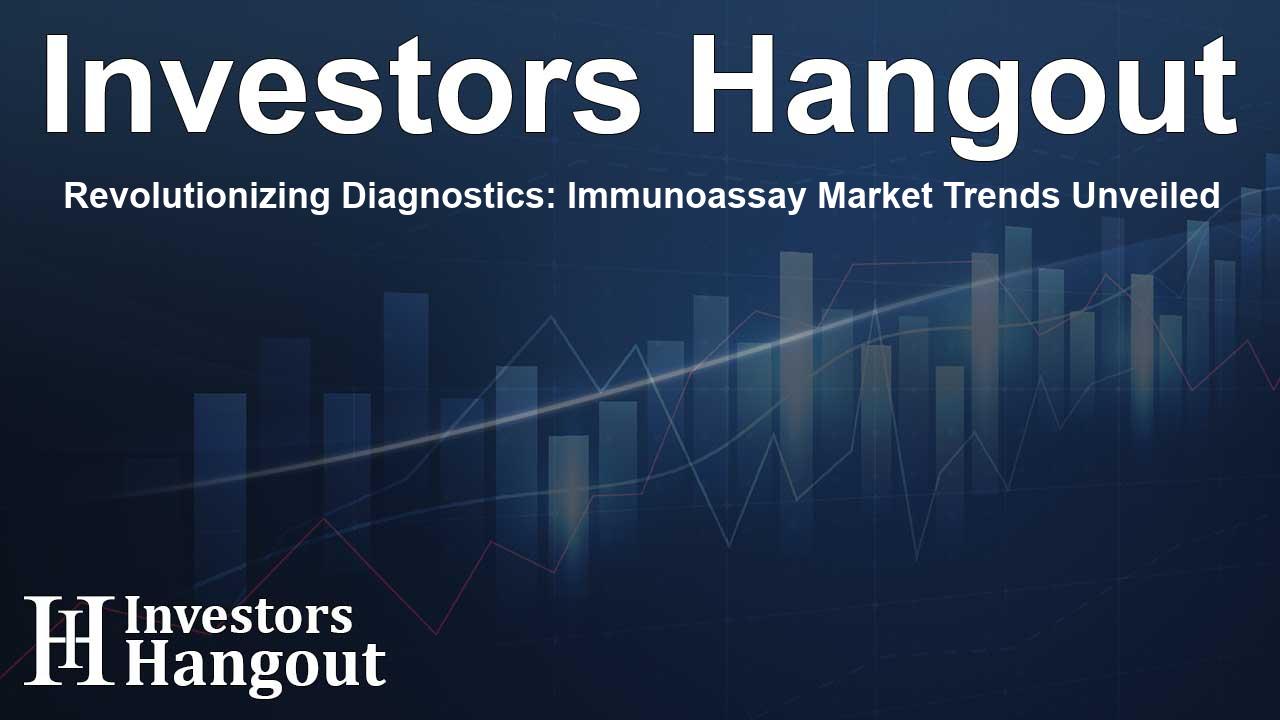Revolutionizing Diagnostics: Immunoassay Market Trends Unveiled

Revolutionizing Diagnostics: Immunoassay Market Trends Unveiled
Recent insights into the immunoassay diagnostics market reveal a burgeoning sector valued at approximately $37.4 billion. This market encompasses various areas, including centralized laboratories, point-of-care (POC) testing scenarios, and self-testing devices. The continuous evolution of this market is driven by advancements in technology, including artificial intelligence and miniaturization, significantly influencing how healthcare providers approach diagnostics.
Market Overview and Key Findings
The growth forecast for this segment extends through the next few years, identifying critical areas of expansion such as autoimmune diagnostics, personalized medicine, and testing for infectious diseases. These sectors are crucial both in advanced economies and rapidly developing regions of the world. Notably, Roche has established a robust presence, dominating 20.3% of the market. An exciting trend is the emergence of countries like China as a major player, contributing significantly to the Asia Pacific's immunoassay revenue, standing at 37%.
Continuous Evolution of Immunoassays
As noted by industry experts, the ongoing transformation in immunoassay technology is impressive. Daniel Granderson, a Senior Editor at Kalorama Information, stated, 'While immunoassays have established a firm unwavering foundation in clinical diagnostics, their evolution is undergoing unprecedented enhancements.' This evolution includes greater miniaturization and the ability to conduct multiplex testing, revolutionizing environments as diverse as intensive care units and personal home settings.
Segment Highlights and Projections
Key highlights from the market analysis include:
- The autoimmune immunoassay market is anticipated to surpass $1 billion by the end of the decade due to rising demands for clinical testing and improved diagnostic methods.
- The genetic testing segment is set to grow at a compounded annual growth rate (CAGR) of 9.1% from 2024 to 2029, propelled by the rising demand for personalized medical solutions.
- Lab-based immunoassays for infectious diseases remain the most substantial segment, with HIV, hepatitis B and C, and respiratory testing generating significant global test volumes.
- Major players like Roche, Abbott, and Siemens Healthineers lead the market, while numerous smaller firms innovate within specialized fields such as allergy and oncology testing.
Navigating Strategic Challenges
This report presents valuable insights tailored for stakeholders within the diagnostic sector, designed to support diverse roles, such as:
- Product and Portfolio Managers can identify high-growth areas and phase out older products.
- R&D Directors and Clinical Scientists gain perspective on emerging trends in biomarker innovation and assay development.
- Investors and M&A Analysts benefit from benchmarking against top revenue generators and discovering potential targets for acquisition or partnerships.
- Healthcare and MedTech executives can utilize these insights for informed commercialization, strategic growth, and competitive positioning.
The Importance of Current Trends
Immunoassays form the backbone of diagnostic medicine, shifting from exclusive laboratory use to more accessible applications. As global challenges arise—aging populations, increased chronic illness rates, and a push for decentralized healthcare—immunoassay technologies are transforming to meet these demands. From hormone testing kits usable in the home environment to genetic profiling tools for oncology, the future of clinical diagnostics and health tech is markedly bright.
About the In-Depth Report
The report titled Global Immunoassay Market: Trends, Technologies, and Growth Opportunities, 2025 draws from rigorous analysis of financial data, product offerings, and interviews with over 30 industry specialists. This comprehensive gathering of data encompasses various disease categories across key global regions, ensuring a thorough market overview.
Frequently Asked Questions
What is the estimated value of the immunoassay market?
The immunoassay market is valued at approximately $37.4 billion.
What are the key growth segments identified in the report?
Key growth segments include autoimmune diagnostics, personalized medicine, and infectious disease testing.
Who are the leading companies in the immunoassay market?
Main companies include Roche, Abbott, and Siemens Healthineers among others.
What technological advancements are impacting the market?
Technological advancements like AI-assisted interpretation and miniaturization are significantly impacting the immunoassay market.
How is the future outlook for the immunoassay market?
The future outlook is positive, with continued growth expected through 2029 in several key diagnostic segments.
About The Author
Contact Caleb Price privately here. Or send an email with ATTN: Caleb Price as the subject to contact@investorshangout.com.
About Investors Hangout
Investors Hangout is a leading online stock forum for financial discussion and learning, offering a wide range of free tools and resources. It draws in traders of all levels, who exchange market knowledge, investigate trading tactics, and keep an eye on industry developments in real time. Featuring financial articles, stock message boards, quotes, charts, company profiles, and live news updates. Through cooperative learning and a wealth of informational resources, it helps users from novices creating their first portfolios to experts honing their techniques. Join Investors Hangout today: https://investorshangout.com/
The content of this article is based on factual, publicly available information and does not represent legal, financial, or investment advice. Investors Hangout does not offer financial advice, and the author is not a licensed financial advisor. Consult a qualified advisor before making any financial or investment decisions based on this article. This article should not be considered advice to purchase, sell, or hold any securities or other investments. If any of the material provided here is inaccurate, please contact us for corrections.
